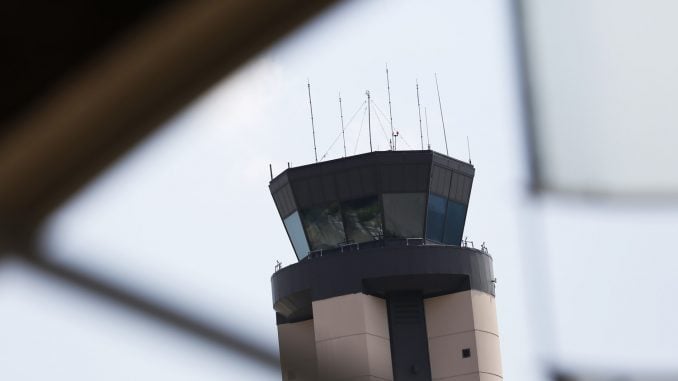
WASHINGTON, D.C./RALEIGH President Donald Trump outlined a plan on Monday to privatize the U.S. air traffic control system to modernize it and lower flying costs, but his proposal drew immediate criticism from Democrats who said it would hand control of a key asset to special interests and big airlines.Trump’s proposal to spin off air traffic control from the Federal Aviation Administration (FAA) was part of a week-long White House focus on infrastructure.”We’re proposing reduced wait times, increased route efficiency and far fewer delays,” Trump said in comments Monday. “Our plan will get you where you need to go quickly, more reliably, more affordably, and yes, for the first time in a long time, on time.”Executives from United Airlines, Hawaiian Airlines, American Airlines and Southwest Airlines, all represented by the Airlines for America lobbying group, attended the Trump speech. The group praised the Trump plan which is backed by most airlines, but opposed by many Democrats on Capitol Hill and some Republicans.”Our nation’s infrastructure in the sky is a vital part of our economy, and the â¨demand for air services in the United States is growing,” said A4A President and CEO Nicholas E. Calio. “The president’s leadership means that we can look forward to legislation that gets government out of the way so we can modernize for the future and maintain our global leadership in aviation. Today’s White House announcement puts consumers first ahead of the status quo.”Trump said current air traffic reform efforts have failed and were a “total waste of money.”Congress would have to approve privatization, but proponents say it would speed up the rollout of new aircraft tracking technology, replacing current ground radar dating back to World War II. Supporters of the plan also say a private entity could sign contracts with vendors more quickly than if deals are put through the FAA’s procurement process, which also is subject to budget instability.Opponents, including Delta Air Lines, say the U.S. system is so large that privatization would not save money, and would drive up ticket costs and could create a national security risk. Opponents also say technology upgrades would be sidetracked while the private entity was set up, potentially adding years to awarding contracts.The new systems would represent major wins for U.S. companies that have been working on new technology for years. Harris Corporation is a leading candidate to supply the FAA with real-time aircraft tracking data in partnership with satellite operator Iridium Communications. The pair are already working in air traffic surveillance with authorities in Canada, Italy, Ireland and Denmark.Under Trump’s proposal, a board made up of airline, union and airport officials would oversee the nonprofit entity that would assume oversight after a three-year transition.House of Representatives Democratic Leader Nancy Pelosi (D-Calif.) said in a statement that Trump was recycling “a tired Republican plan that both sides of the aisle have rejected” and would “hand control of one of our nation’s most important public assets to special interests and the big airlines.”The Aircraft Owners and Pilots Association worry that technology upgrades and privatization will mean new fees on small plane owners.”The U.S. has a very safe air traffic system today and we don’t hear complaints from our nearly 350,000 members about it,” said Mark Baker, the group’s president.The infrastructure push from the White House is not unexpected as Trump seeks to refocus attention on core campaign promises to boost jobs and the economy. On Wednesday, Trump will travel to Cincinnati to talk about improvements to the 12,000 miles of inland waterways, dams, locks and ports critical for shipping farm products.Reuters News Service contributed to this report.



